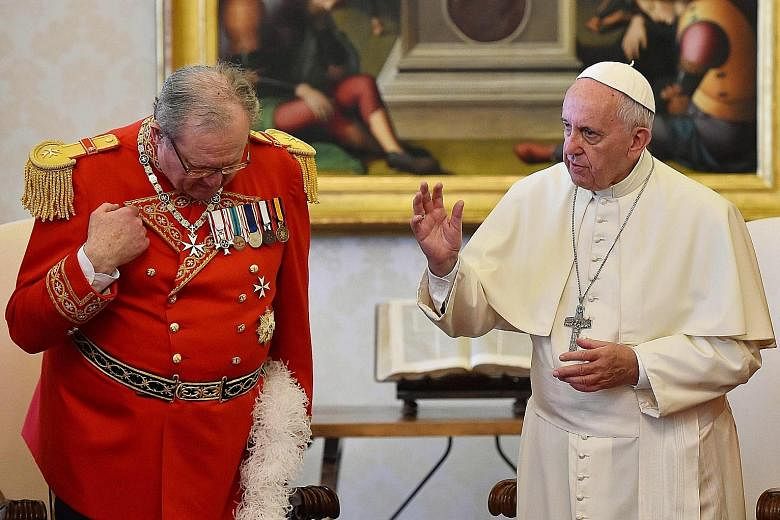ROME • It began as a fight over staffing. Then came a dispute about condoms, followed by papal concerns about Freemasons.
Now it has become a full-scale proxy war between Pope Francis and the Vatican traditionalists who oppose him, with the battleground being a Renaissance palace in Via dei Condotti, Rome's most exclusive street.
The palace is the headquarters of the Knights of Malta, the mediaeval Roman Catholic order. For months, an ugly, if quiet, spat over staffing simmered behind the order's walls before spilling across the Tiber River to the Vatican.
The Pope and his lieutenants sent angry letters. The Knights ignored them, claiming sovereignty. Last week, the dispute finally blew up.
Pope Francis took the extraordinary steps of demanding the resignation of the order's leader - a decision the Knights officially accepted on Saturday - and announcing that a papal delegate would step in.
Until last week, the Knights order was led by its conservative Grand Master Matthew Festing of Britain.
Conservatives promptly denounced what they called an illegal annexation and ideological purging by a power-obsessed pontiff, while liberal observers saw the whole episode as resulting from an act of subterfuge by the Pope's most public critic within the Vatican hierarchy, US Cardinal Raymond Burke.
"The Vatican is a thing built of tradition," said Mr John Thavis, author of The Vatican Diaries and a veteran church analyst, "and once those traditional parts start feuding with each other, that is a dangerous sign."
The Pope remains one of the world's most popular figures, but the spat with the Knights is a small indicator of how the political tensions rippling across the globe are alive in the Vatican, too.
Only a year ago, his calls to fight climate change and help migrants seemed to place him in the lead of a progressive global vanguard, in keeping with his push for a more welcoming Church. Now, suddenly, he is more politically isolated.
The election of US President Donald Trump and the rise of far-right populists in Europe have ushered in an angrier era - and emboldened those traditionalists inside the Vatican who sense that the once-impregnable Pope could be vulnerable.
Supporters of Cardinal Burke have complained that the Pope, for all his talk of fostering debate, was intolerant of opposing views, especially more orthodox ones.
"It sends a message to the rest of the Catholic world that if you try to stand for orthodoxy in the Church, you are going to be sent away," said Mr Michael Hichborn, president of the Lepanto Institute, a conservative Catholic organisation in Virginia. "And the people pushing for heterodoxy will be put in power."
NYTIMES

